- Home
- William Ritter
Jackaby Page 13
Jackaby Read online
Page 13
“You did! You lied to me!”
The guard on Jackaby’s arm attempted to position himself between the two, mumbling an ineffective, “Step back, please, madam. Out of the way. Step back.” An officer from the lobby came to assist, tugging at her arm. She jerked it away and persisted.
“You told me she would be better by morning!” she cried out as we began to move forward again.
Now Jackaby’s unflappable expression faltered. His eyes went wide and his brow creased. He attempted to stop, and the officer behind him gave him a shove. “Mrs. Morrigan?” he called over his shoulder as we were pressed toward the door. “You mean to say she isn’t?”
“Worse!” Mona’s voice hollered past the uniform now bodily restraining her. “A hundred times worse! The worst she’s ever been!” The officers finally restrained the woman and succeeded in ushering Jackaby and me out the door.
Jackaby’s face was ashen as we reached daylight. He did not speak again until the two of us had been loaded into the back of the police wagon. The policeman slammed the doors, and we were alone on hard wooden seats, which stunk of stale beer and vomit.
“It’s bad?” I asked.
He breathed in slowly before responding. “Each night Mrs. Morrigan has wailed, a life has been brutally ended. If she wails, now—wails a hundred times worse, now—then yes, I imagine it is very bad, indeed.”
Chapter Nineteen
Well, look on the bright side,” I said, after the officer had slid shut our cell doors and clicked tight the locks. “At least we’re in jail.”
In the adjacent cell, my employer pushed back a handful of dark hair and raised an eyebrow in my direction. The processing officer had taken our personal effects, and Jackaby looked exceptionally frail in the barren cell without his silly hat and coat to hide in.
“True, we’ve been locked in here,” I continued. “But you could also say the murderer has been locked out there, which is something.”
It wasn’t as bad as I had feared. Jackaby and I had been stuck in separate holding cells, of course, but the enclosures ran along the wall, connected on either side, so I didn’t feel entirely alone. Aside from my employer and me, the lockup contained only one other inhabitant—a peacefully snoring drunk with cheery red suspenders who lay on the far side of Jackaby. Our cells faced not the drab cement slab I had envisioned, but instead a simple, carpeted walkway, bordered by a couple of desks with official-looking documents sorted neatly in trays. An officer sat at the nearest one, stamping papers with a satisfying thup-thup. In the corner was a small table with a few coffee mugs and a half-eaten cake with bright white frosting. Tacked on the wall above it was a handwritten Happy Birthday, Allan. I had heard of offices feeling like prisons, but in this case our prison felt, rather anticlimactically, like an office.
“I would rather be at home on this occasion,” said Jackaby.
“I’m just thankful the constables can’t go calling my parents to bail me out,” I said. “I don’t want to know what they would think if they could see me now.”
“Why should you mind what some old constable thinks of you?”
“Not the constables, my parents. I can’t imagine how all this would look to them.”
“Does it matter, considerably, what your parents think?”
“Well . . . of course it does. They’re my parents. How did your parents react when you started being—you know—you?”
Jackaby ran a finger along the thick bars of the cell, a scowl twisting his brow into a knot. “My home, unlike this jail cell, has been fortified against the sort of dangers presently at large in the city. I would feel far more secure within the premises of my own property on Augur Lane.”
“I saw you setting up ‘fortifications.’ I think bricks and steel might actually be a slightly more effective deterrent than a pinch of salt and powdered garlic. Besides, we don’t exactly make easy targets; we’re surrounded by police.”
“I suppose that’s fair, Miss Rook, and true enough,” answered Jackaby, “unless, as I am beginning to suspect, our villain wears a badge.”
I glanced at the officer on duty behind the desk. His little stamp continued to thup rhythmically. He was a portly, rosy-cheeked man with a walrus mustache, the bristles of which were smattered with white frosting. “Do you think that’s likely?” I asked.
“It is a decided possibility.”
My mind flashed back to the crime scene. “The door,” I said. “Charlie said he’d had to kick it in.”
“Hmm? Yes, that’s right. He also reasoned, logically, that the murderer must have entered and escaped through the window.”
“Then whose claws raked into Henderson’s door?” I asked.
“Ah.” Jackaby leaned his back on the bars and watched the drunkard snoring for a few moments. “You noticed that, did you?”
“The thing was in poor shape, all splintered and cracked. It had clearly been forced open, as he said, but footprints are footprints and paw prints are paw prints. I know you spotted them, too.”
“Indeed. I managed to collect a few small hairs, as well, but until I have my coat back, and can return to my laboratory to test them, they might as well be turnips, for all they’ll tell us.”
“But why would Charlie lie?” I asked, lowering my voice as a door opened on the far side of the office. Inspector Marlowe came in, trailing a pair of uniforms. “It doesn’t make sense—he’s been the most helpful of the lot! What’s he hiding?”
“That is an excellent question,” said Jackaby. “It seems the detective has a few secrets.”
“Funny,” said the chief inspector, from the doorway, “that’s precisely what I was thinking about you. Maybe you really can read minds, or whatever it is you do.” He drew to a stop in front of Jackaby’s cell.
“Ah, Marlowe,” answered Jackaby, “so good of you to join us. I’d offer you refreshments, but I’m afraid we’re all out in here.”
“There’s cake in the corner,” I offered, helpfully.
“Good, yes. There does appear to be cake, as my young associate observes, in the corner.”
“Enough, both of you,” Marlowe snapped. “I have tolerated your lunatic claims and your blatant disregard for authority. I will not tolerate withholding evidence in the middle of a homicide investigation.”
“We’ve done nothing of the sort,” said Jackaby, a bit haughtily. “You’ve done the withholding. You’ve got my tuning fork—which, I remind you, I would like back. We have withheld nothing.”
“Oh, no?” The inspector held out a hand, and one of the uniformed men shuffled forward to hand him a folded paper. Marlowe opened it slowly. “Then I suppose this map, found in your office on Augur Lane, is not drawn on Arthur Bragg’s personal stationery, and written in the victim’s own hand?”
“Oh, that,” said Jackaby. “Yes well, that wasn’t withholding so much as borrowing, or possibly safekeeping.”
Marlowe said nothing, but filled his expression with even more reproach. The officers who had taken position at either side of Marlowe wore matching, humorless scowls that suggested a lifetime of taking themselves too seriously. One of them also had several large, pale gray splatters across his shoulders, which suggested Douglas the duck had excellent aim. They had drawn to a halt, but the swampy, sulfurous smell that accompanied them was gradually creeping its way into the cells.
“Oh, don’t look so put out,” said Jackaby. “You could have asked for it.”
“I’ve got plenty to ask,” Marlowe replied. He shot a glance my way and added, “Both of you. But we’ll be conducting this interrogation one at a time. Jackaby, I think it’s time you and I had a little talk.”
Marlowe nodded a silent command, and the cop with duck-poop epaulettes marched to the cell door and stood at military attention. “Detainees will move away from the door!” he barked. Jackaby, already halfway across the cell, rolled his eyes at the officer and took one more step backward. The man unlocked the door and slid it ajar. Jackaby stepped out, and the
guard eyed him with suspicion as he slammed it shut. This fellow managed to make Marlowe seem fun.
Jackaby, Marlowe, and the overzealous guard disappeared down the hallway, leaving the second cheerless policeman to keep an eye on me, presumably because I could get into far too much trouble if left to my own devices in a locked, eight-by-ten cell. It sank in that I had, in fact, been left alone in an eight-by-ten cell, and I began to feel a swelling sensation of helplessness. I fidgeted, worrying the fringe on my new dress.
This was all so preposterous. I don’t know why I felt more secure in the presence of a strange man I had known for less than a day—particularly one whom I had been warned to avoid by nearly everyone I had met—but I hoped that they would be back soon, all the same.
I extended a polite smile to the man guarding me. He returned a blank stare—not simply the expressionless look you might adopt while waiting in line at the bank, but a deeply, aggressively blank stare. He held the sort of posture attainable only by those who have had their sense of humor surgically removed. His uniform looked crisp and free of droppings, but a familiar sulfuric stench still rolled off him.
“Hello,” I ventured.
The officer did not respond.
“So, you had a look around Jackaby’s place? Pretty crazy, isn’t it?”
Still no response.
“Be honest now. You stared at the frog, didn’t you?”
The officer remained silent, but his nostrils twitched involuntarily. He continued to direct his maliciously blank stare toward me.
“I thought so.” I smiled and leaned back on the slab of a bench behind me.
Chapter Twenty
I spent the next hour staring at a small patch of gray sky through the cell window and quietly drumming on the bench with my fingers. I had just perfected my timing so that the regular thup of the desk officer’s stamp fit neatly into the rhythm, when the door finally burst open and Jackaby’s voice preceded him through the hallway.
“Well, of course you would think that, if you’re just going to measure a man’s stability on whether or not he can taste banana when there are no bananas physically present. Narrow-minded and dismissive, as always, Inspector.”
The guard with the dirty shoulders pulled open Jackaby’s cell door, delivering the detective back inside with a shove. He slammed it closed, and then crossed over to unlock mine. “You’re next.” He jabbed a meaty finger in my direction, then stood rigidly at the door, waiting for me.
I whispered across the bars to Jackaby as I rose, “Shall I tell them the truth?”
“Have you killed anyone?” he asked, quietly.
“No, of course not!”
“Then I can’t imagine why you shouldn’t.”
The corridor was quiet, punctuated by the occasional clickity-click of a typewriter in one of the offices we passed. I felt like a girl in grammar school, treading the long hallway to the principal’s office with a hall monitor sneering over me all the way. The guard directed me into a room at the end of the hall. The little chamber was slightly larger than the cell had been, but managed to look even more drab and less inviting. The space lacked even the small, barred window that the cell had possessed, leaving nothing to puncture the dull grayness of the walls. The only light came from a single gas lamp, high on the wall behind Marlowe, who was sitting at a table reading over his notes. I took the chair opposite and waited for the chief inspector to speak. The policeman who had brought me in took his position in front of the door, as if I might leap up and race through the police station at any moment.
The table was plain wood, stained and battered, but sturdy. On it sat the handkerchief-bundled tuning fork, Bragg’s map, and Marlowe’s notebook. The latter lay open as Marlowe reviewed some previous entry. I definitely needed a notebook like that. The chief inspector took his time before slowly closing the book and setting it beside him on the table.
“So, Miss Abigail Rook.” He spoke evenly and leaned his elbows on the table, his fingers steepled under his chin. “You only recently arrived in New Fiddleham, is that correct?”
“Two nights ago, yes,” I answered. “I arrived by boat late in the afternoon.”
“Inauspicious timing, Miss Rook. Late in the afternoon, two nights ago, Arthur Bragg was still alive. That is—right up until he wasn’t. Had you met the man before then?”
“I never did meet him. Only saw his body, up at the apartment yesterday.”
“Are you staying at the Emerald Arch Apartments, Miss Rook?”
“No, sir. I’ve taken a room in Mr. Jackaby’s building on Augur Lane.”
Marlowe raised an eyebrow. “Is that so?”
“Yes, sir. He’s hired me on as his assistant.”
“And invited you to live in his home. Is there any more to the nature of your . . . relationship?” He managed to keep his voice cold and emotionless, but something about the way he paused before the word “relationship” left it laden with unspeakable impropriety.
“What? No!”
Marlowe nodded and made a note. “Why were you at the Emerald Arch Apartments, if not to look for some place to stay?”
I did my best not to let the inspector’s blunt questions and stony bearing get me flustered. “I—I had just started working for Mr. Jackaby—or rather, I think I began working for him while we were there. I was following him on his investigation.”
“Indeed?” Marlow made another note. “Impressive that you should come so quickly to find employment with a man who just happened to be involved in a murder . . . one that took place the very night you arrived in town. Did you seek him out because you were interested in getting a second look at the crime scene?”
The blood was pumping in my ears, and I was quickly beginning to resent the inspector’s implications. “With all due respect, sir, I would be employed by half a dozen other respectable townspeople if any of them had been hiring. Mr. Jackaby had work for me, that’s all—and I’m glad he did, Inspector. He’s a bit strange, it’s true, but at least he’s a competent investigator. His methods don’t include locking up everyone who tries to help.” I realized I had let Marlowe throw me completely off balance, and I sat back nervously, waiting for his rebuke.
To his credit, the chief inspector took my comment in stride. He simply made another quiet mark in his notepad, and continued in the same even tone, a faint touch of gravel in his voice.
“Speaking of Mr. Jackaby’s methods, do you recognize this?” He pushed the map across the table toward me.
“Yes, sir,” I answered, meekly.
“Care to explain it?”
“It’s a map. Mr. Bragg seems to have been researching a string of deaths just outside of New Fiddleham. We believe it’s probably why he was killed.”
“A compelling piece of evidence. Care to explain how it came to rest in the offices at 926 Augur Lane?”
“Oh, yes. I guess Jackaby discovered it in Mr. Bragg’s room, and thought it might be worth looking into.”
“And so he stole a crucial piece of evidence?”
“Well, I don’t think he exactly meant to steal it. I’m sure he was planning on . . .”
“Was this before or after I discovered the two of you contaminating the crime scene?”
I swallowed. “After.”
“Before or after the two of you ignored my order to leave the premises and went, instead, to speak with a witness—a witness who was brutally murdered the following night?”
“Er—after that as well, sir,” I admitted.
“Why don’t we start at the beginning, Miss Rook.”
And so we did. I told him everything, from the kobold on my coat to the silent screams torturing Mr. Henderson, and the effect of Jackaby’s tuning fork. I had explained all about Mona and the banshee, and had just reached old Hatun with her shawl-of-partial-invisibility when there came a knock at the door. Marlowe, in spite of his furrowed brow and occasionally rolling eyes, had listened to it all, jotting notes in his book. “We’ll get back to you in a momen
t,” he told me, and nodded to the policeman at the door.
The guard opened it a crack and then quickly stepped away, letting it swing wide. He popped instantly to attention beside the doorway. Commissioner Swift stood in the hall, looking thoroughly out of place in the plain, practical quarters of the police station. He wore the same expensive black coat with red trim and matching rosy derby. His collar looked starched, peeking up to frame a dark paisley cravat. He leaned heavily on his polished cane, straightening slightly as Marlowe and I turned to look.
With stiff but purposeful steps, Swift strode into the interrogation room. He fought against his leg braces to affect a normal gait, gritting his teeth every time the mechanism gave out the slightest squeak as he moved. He marched to the table beside Marlowe.
The chief inspector looked as surprised to see him as I was. “Commissioner,” he managed with a respectful nod. “What can I do for you?”
“You can carry on, Inspector. I’ll just be overseeing things. Who do we have here? I thought you were interrogating the infamous Mr. Jackaby.” The commissioner picked up Marlowe’s notebook and flipped back a few pages, scanning the scribbled entries.
“This is his associate, sir, one Abigail Rook. I was just taking a few statements.”
“So I see.” Swift scowled at the notepad and flipped another page. “A banshee? A magic shawl? Really? Trolls, Miss Rook?” His voice dripped with sardonic incredulity as he raised his eyes to mine over the top of the book.
“Just the one troll,” I replied timidly. “I’m told he’s very small.”
“We were nearly finished here,” Marlowe stated, reaching for the book. “If I may?”
Swift tossed it back to the table, ignoring Marlowe’s hand. “You are finished here. I won’t have my chief inspector wasting his time listening to fairy tales while some madman hacks my city to pieces. Do you have any idea how bad that makes me look? Any idea how far I will drop in the polls every time a body turns up in my jurisdiction?”

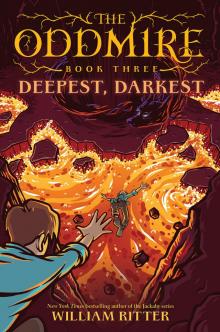 Deepest, Darkest
Deepest, Darkest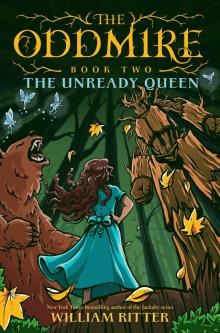 The Unready Queen
The Unready Queen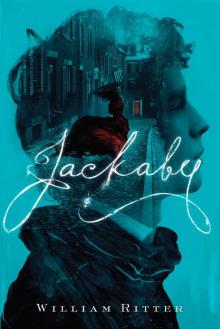 Jackaby
Jackaby Changeling
Changeling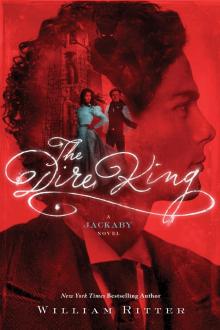 The Dire King
The Dire King Ghostly Echoes
Ghostly Echoes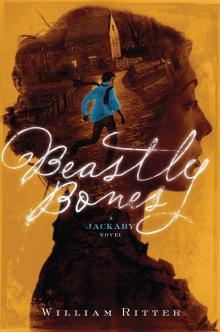 Beastly Bones
Beastly Bones